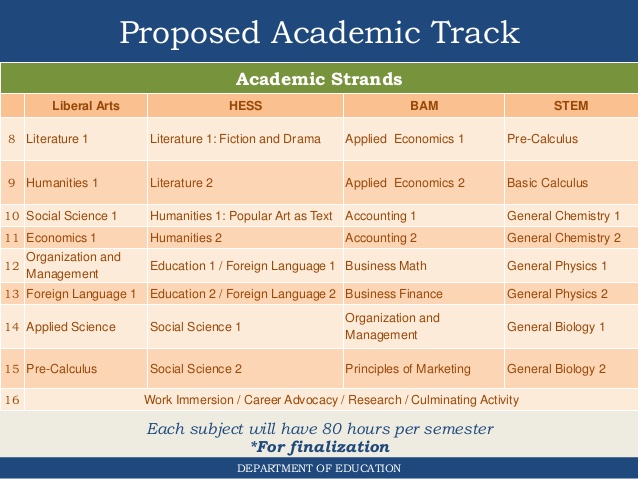How Effective Are College-level Courses in High School?
DepEd's K to 12 senior high school years come in different tracks. One track is called the academic track which comes in four different strands, Business, Accountancy, Management (BAM); Humanities, Education, Social Sciences (HESS); Science, Technology, Engineering, Mathematics (STEM); and General. There are other tracks in senior high school: Technical-Vocational Livelihood, Sports, and Arts and Design. Regardless of track, the senior high school years are advertised to make each student college-ready. This of course suggests that the specialized subjects within the academic tracks are "college-level".
It is therefore useful to examine the effectiveness of taking college-level courses in high school. Fortunately, this question can be addressed by looking at educational systems that already offer college-level courses in secondary school. The United States K-12 system is one great source of data for this inquiry. High school students in the US are given the opportunity to take Advanced Placement (AP) courses. The AP program permits US high school students to
take introductory college-level courses. With this program, students may also receive college
credit by passing a standardized exam administered after the course.
Albeit the data are available, it is not straightforward to compare students who have taken these AP courses against those who have not. Enrolling in an AP course goes through a selection process. It should not be surprising to see at first that AP takers in general perform better academically. Thus, to make the comparison valid, a propensity matching must first be done. In this procedure, only those students who share similar characteristics would be included in the comparison so that differences can be safely attributed to taking an AP course or not, and not some other reason.
Such a study have been performed and the results have been published in the Journal of Educational Research. The abstract of the paper is as follows:
 |
| For the finalized strands, please visit DepEd's Academic Track |
Albeit the data are available, it is not straightforward to compare students who have taken these AP courses against those who have not. Enrolling in an AP course goes through a selection process. It should not be surprising to see at first that AP takers in general perform better academically. Thus, to make the comparison valid, a propensity matching must first be done. In this procedure, only those students who share similar characteristics would be included in the comparison so that differences can be safely attributed to taking an AP course or not, and not some other reason.
Such a study have been performed and the results have been published in the Journal of Educational Research. The abstract of the paper is as follows:
ABSTRACT
The Advanced Placement (AP) program is an educational program that permits high school students to take introductory college-level courses and receive college credit by passing a standardized end-of-course exam. Data were obtained from a statewide database of 2 high school graduating cohorts (N = 90,044). We used a series of propensity score analyses and marginal mean weighting through stratification to examine the impact of the AP program on students' academic achievement as measured by ACT scores. Results indicate that merely enrolling in an AP course produces very little benefit for students. Students who take and pass the AP exam, however, obtain higher ACT scores, even after controlling for a wide variety of academic, socioeconomic, and demographic variables. The authors conclude the article by discussing aspects of the AP program that remain unanswered.The last three sentences of the above abstract are clearly stating the findings of this study. Merely taking an AP course does not mean improved college readiness. The benefits only appear if a student also chooses to take the exam. And more importantly, only if such student passes that exam. A student who has taken an AP course but has failed in the exam likewise does not perform better than a student who has not taken an AP course. What this means is that the quality of an AP course is extremely important. Since it is clear that only those who have passed the exam at the end of the course benefits, it is obvious that not all high schools can possibly deliver such a beneficial academic experience. When something does not produce its intended outcome, it is really just a waste of time, resources and money from students, parents, teachers, schools and taxpayers.
Comments
Post a Comment